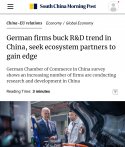Wrong. Marketing use doesn't mean anything. There is only emergency use approval and general use approval. So I don't know what your are trying to spin.No. China’s EUA approval wasn’t a marketing approval, it’s more analogous to a Phase I trial. China gave marketing approval for Sinopharm late into 2020/early 2021 so the analogue Pfizer marketing approval came earlier. First to market on a more complex, effective, and first-in-class product. Main point is that China having the advantage in paper publishing is not at all a guarantee it will “win” the tech race/war/whatever in any amount of time given lags to commercialization, incumbent U.S. advantages (of which the COVID vaccine was illustrative and more widely known), and the business environment in which corporates operate, as well as the other variables that impact the business environment.
Pfizer had general FDA approval in August 2021. To my knowledge, August 2021 is LATER than December 2020. No?
So in both cases later than China's vaccine no matter how you cope
Cansino and sinopharm had approval for general use by other countries by December 2020.
mRNA vaccine are only 10 years old, and still experimental. We don't know the long term effects of related mRNA vaccinations. More and more reports have come out of blood clots, increased autoimmune activation, myocarditis with mRNA vaccines.
In medicine, we really care about hospitalization and deaths. In these cases, sinopharm efficacy is comparable to mRNA. That's what's really important.
Additionally mRNA vaccines need deep freeze transport, and is more expensive to make, which severely limits it's access to people in need, which is one of the most important factors in vaccine use, while sinopharm and Sputnik V are cheaper and easier to store. In a pandemic, this is much more important.
US incumbent advantage doesn't translate to better production or necessarily more advanced technology, (eg. Electric cars). Since you mentioned China's more published papers doesn't guarantee a win in the tech war, neither does US incumbent advantage.

